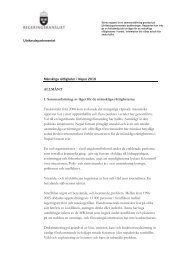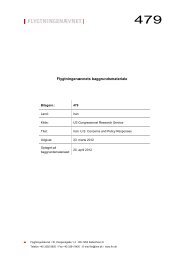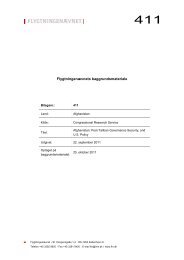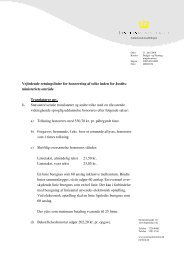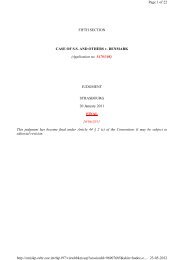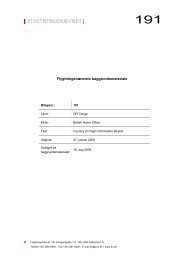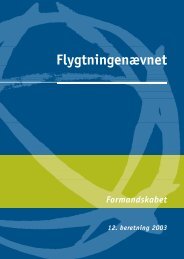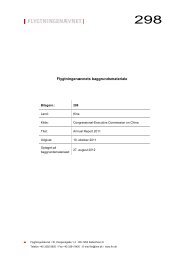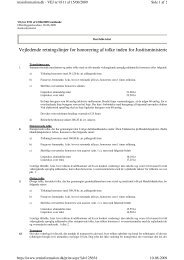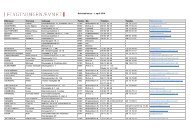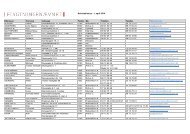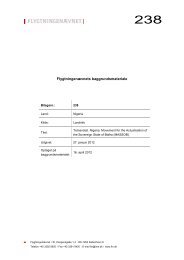Annual Report - National Human Rights Commission
Annual Report - National Human Rights Commission
Annual Report - National Human Rights Commission
You also want an ePaper? Increase the reach of your titles
YUMPU automatically turns print PDFs into web optimized ePapers that Google loves.
An Overview<br />
○ ○ ○ ○ ○ ○ ○ ○ ○ ○ ○ ○ ○ ○ ○ ○ ○ ○ ○ ○ ○ ○ ○ ○ ○ ○ ○ ○ ○ ○ ○ ○ ○ ○ ○ ○ ○ ○ ○ ○ ○ ○ ○ ○ ○ ○ ○ ○ ○ ○ ○ ○ ○ ○ ○ ○ ○ ○ ○ ○ ○<br />
○<br />
inequalities and whose systems fail to provide any hope for justice are fertile breeding grounds<br />
for terrorism, which, more often than not, thrives in environments where human rights and more<br />
particularly Economic, Social and Cultural <strong>Rights</strong> are denied by the State and Political rights are<br />
violated with impunity, both, by the State and non-State actors. Systemic denial of Economic,<br />
Social and Cultural <strong>Rights</strong>, like Right to food, health, education etc. are causative factors of<br />
conflict and terrorism. Any worthwhile strategy to resolve conflicts and terrorism will have to<br />
ensure enjoyment of the full range of Economic, Social and Cultural <strong>Rights</strong>.<br />
2.9 While inquiring into complaints of serious injuries or death due to electrocution as a result of victim<br />
coming into contact of live transmission wire hanging at a low level or fallen on the ground, the <strong>Commission</strong><br />
while applying rule of strict liability observed that a State professing to be a welfare State is expected to<br />
ensure liberal constructions of benefits and benevolent legislation like Section 18(3) of the Protection of<br />
<strong>Human</strong> <strong>Rights</strong> Act, 1993, to promote the philosophy of the Constitution and the statute. The <strong>Commission</strong><br />
also observed that the loss of human life by fact other than natural death is not capable of being calculated<br />
in term of Rupees. The <strong>Commission</strong> emphasized that object of granting “immediate interim relief u/s<br />
18(3) of the Act of Constitutional <strong>Human</strong> <strong>Rights</strong> – right to life – is only in the nature of an immediate<br />
help to the next of the kin, in their hour of distress, by applying balm to their wounds. The grant of<br />
immediate relief is only a palliative for the act of instrumentalities of the State, which result in infringement<br />
of the fundamental rights of the citizen. Grant of relief is only a step to enable the State and its instrumentality<br />
to repair the damage done to the rights of the victim.<br />
2.10 The <strong>National</strong> <strong>Human</strong> <strong>Rights</strong> <strong>Commission</strong> firmly believes that protection and preservation of<br />
Civil and Political <strong>Rights</strong> is possible only if there is an efficient and effective criminal justice delivery<br />
system in the country, which enables fulfillment of the mandate in Part-III of the Constitution. With a<br />
view to evolve some effective guidelines to ensure fair trial as well as proper protection to the victims<br />
and the witnesses of the crime, the <strong>Commission</strong> approached the Hon’ble Supreme Court of India by<br />
way of Special Leave Petition (which was later on converted by the Supreme Court in Writ Petition)<br />
against the judgement dated 27.6.2003 passed by the trial court in the famous case, known as, Best<br />
Bakery Case acquitting all the 21 accused, as a result of witnesses turning hostile due to external<br />
pressure, resulting in mis-carriage of justice. The details of the case from the stage of filing SLP and<br />
other appeals in the case, till passing of the order dated 12.04.2004 by the Supreme Court allowing<br />
the criminal appeals and setting aside the order of the acquittal of all 21 accused, have been reported<br />
by the <strong>Commission</strong> in its <strong>Annual</strong> <strong>Report</strong> for the year 2003-2004. The Supreme Court further directed<br />
re-trial of the case outside the State of Gujarat. The trial of the case before the trial court in Mumbai is<br />
at an advanced stage, at present. The larger issues touching upon the credibility of criminal justice<br />
delivery system, such as, protection of witnesses and victims of the crime and the need to lay down<br />
guidelines on account of witnesses turning hostile at the trial, are still under consideration of the<br />
Hon’ble Supreme Court of India in Writ Petition of 109 of 2003.<br />
2.11 Major events in Gujarat, court proceedings and the <strong>Commission</strong>’s orders in Case No.<br />
256/6/2003-2004-WC (Case of Ms. Bilkis Yakoob Rasul) leading to the orders passed by the<br />
<strong>National</strong> <strong>Human</strong> <strong>Rights</strong> <strong>Commission</strong> <strong>Annual</strong> <strong>Report</strong> - 2004-2005<br />
5<br />
AR-Chapter-1-19-10-6-06.p65<br />
25<br />
7/17/06, 6:29 PM



